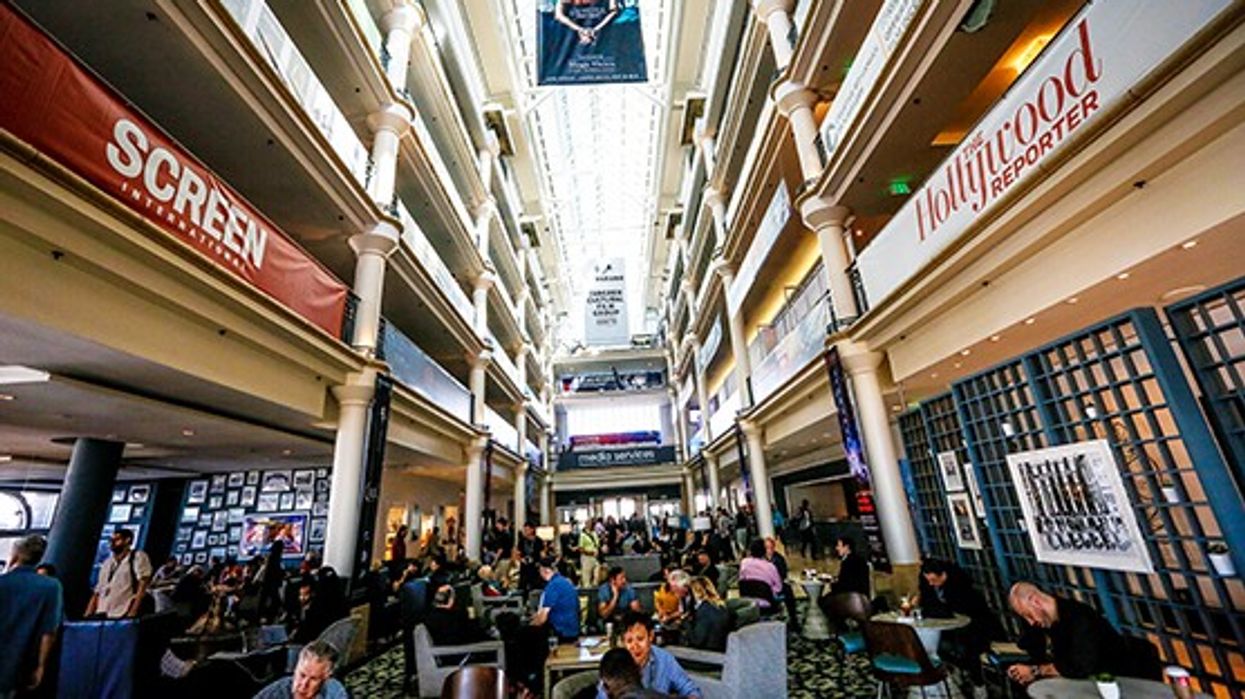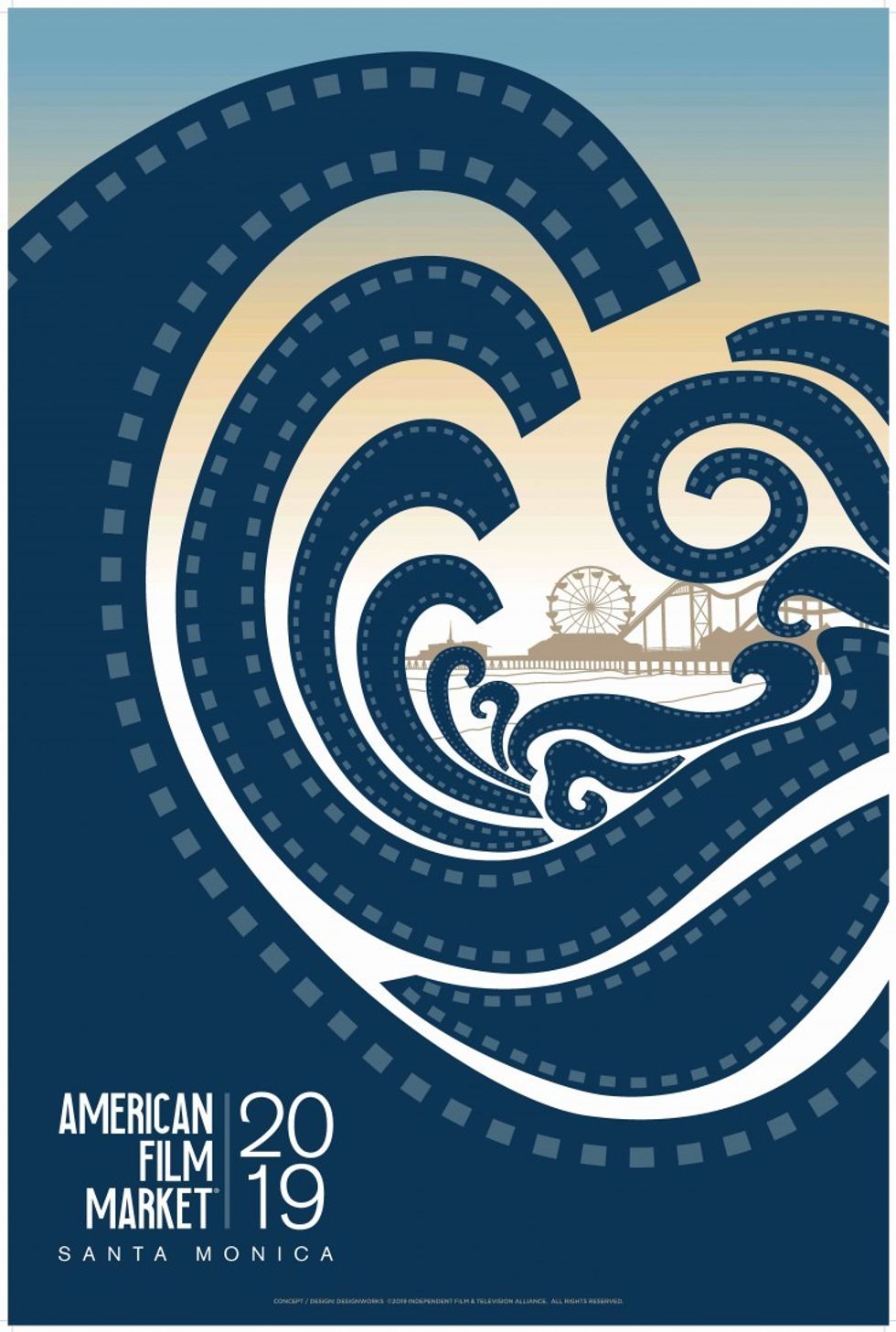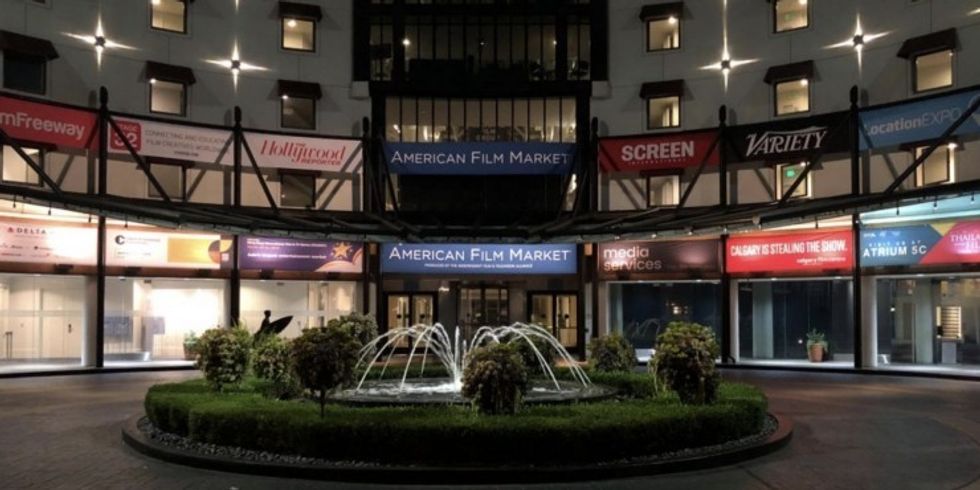Is AFM A Waste of Time and Money?
Hopefully, this article doesn’t cost me my career.

Before we start, some background on me: my name is Evan Littman, and my company, GetMade, consults for a variety of entertainment entities. Every year, I attend the three major markets (Berlin, Cannes, and the American Film Market), where I evaluate films and film packages for my clients to acquire. These are films you’ve heard of, or will hear of (here’s an example).
The American Film Market (AFM) takes place in Santa Monica every year in early November. It just wrapped up this week, so I wanted to take a minute and share some of my observations from the ground floor. More specifically, I want to talk about what AFM is, what it isn’t, how it’s changing, and how you should think about it as an aspiring filmmaker.
To answer the question in the headline, and to legally cover my ass, I should say that AFM is not a scam. But I do believe AFM engages in exploitative marketing practices, specifically targeted at aspiring filmmakers.
What Is AFM?
AFM is a market, produced by the Independent Film & Television Alliance (IFTA), where foreign sales agents sell (license) films to distributors around the world. AFM is NOT a festival – there is no film celebration or red carpet event like there is in Cannes. In contrast, the Cannes Film Festival takes place at the same time as the Cannes Film Market (the Marche du Film), but they are two different events. This means that AFM is not built for the average person, but rather for buyers and sellers to interact and conduct regular business.

The market is located along the beachfront area in Santa Monica, in hotels like Casa del Mar, Shutters, Le Merigot, the Viceroy, and the Loews. The majority of the production/sales companies are in the Loews. During the market, each production/sales company rents out a room in the Loews for about $40,000 to $50,000. Each company also must purchase a badge for its employees so they can access the Loews and move freely throughout. Those badges run about $500 or more per person. As you can see, it’s expensive to attend AFM.
During the market, the production/sales companies stay in their rooms, and the buyers (who also have to purchase badges at $500 a pop) go from company to company to meet, discuss, negotiate, and close deals for projects. It’s an extremely busy time, and it’s not uncommon for a sales agent to double- or triple-book a meeting timeslot in their rush to close deals.
There are hundreds of buyers and hundreds of sellers in the market, all of whom have spent a chunk of money to fully participate. The bigger the market grows, the more participants there are, and the more money AFM as an organization can earn.
What Happens at AFM?
The American Film Market is a market where production/sales companies (sellers) and distribution companies (buyers) from around the world congregate to meet, negotiate, and close deals for licensing and acquisition of independent feature film projects. There are some other things that happen there, but it is primarily aimed at those two segments of the industry: buyers and sellers.

Sellers typically send out the list of films they’re bringing to the market about a week beforehand. Although that gives buyers a limited time to evaluate each project, it also creates immense pressure to close deals quickly. When you read stories in Deadline or THR about projects getting sold out around the world, you should know how hard people worked to make it happen. Here’s Neill Blomkamp’s latest. Here’s Guy Ritchie’s latest.
As I mentioned, sellers stay in their rooms (offices/booths) while buyers roam the halls. Meetings are set by appointment only, unless you have an urgent offer for a project, and most sellers have a completely packed schedule. It’s meetings from 8am to 6pm, then drinks from 6pm to 8pm, then dinner, and then maybe attending one of the social functions put on by a production/sales company or a film commission. Then we do it again the next day.
Part of my job is to evaluate projects on behalf of foreign distributors. I read, analyze, and compile all available projects into a database that I review with my clients before each market. Once we’ve decided which projects to target, I help them negotiate and close those deals. I do a lot of running from office to office, smoothing things over and massaging numbers (and egos) to make sure my clients get what they want at a price they’re comfortable with. I use my personal relationships, my business experience, and my uncanny ability to annoy people until they answer my emails.
Once a buyer finds a project they like, a Minimum Guarantee (MG) offer is made. It’s usually lowball, so the seller asks for more. Then they negotiate until both parties find a number that the project’s producer will accept. You might see emails along the lines of “we really need you to get to $XX,” or “$XX is our max offer.” Once the deal terms are set, the seller sends an email outlining everything both parties have agreed to. Formal paperwork will follow in the coming weeks.
Notice how there’s nothing here about buyers or sellers taking meetings with people they’ve never heard of. That’s because everyone knows everyone, and if there’s someone you’d like to meet, you’re just an email intro away from a handshake. It’s a small, close-knit segment of the industry, so if you’re on the outside, it’s hard to get in. Generally, AFM isn’t for non-industry people. That’s what is so frustrating about how the organization advertises to aspiring filmmakers.
How Is AFM Changing?
Natural market forces have presented unique challenges to the independent film space, which is caught between a rock and a hard place. The rock is mega-franchise films that suck all the oxygen out of the room and leave very little opportunity for independent theatrical feature films to make money. The hard place is the rise of direct-to-consumer streaming services, which, combined with the death of physical media, crushed the ancillary market for indie films. When independent films underperform, it hurts the production/sales company, the domestic and foreign distributors, and future valuations of independent films. When enough films disappoint at the box office, revenues can’t keep up with expenses, and companies start going out of business.
Big production/sales companies have consolidated at the top of the market in order to cut costs. Smaller companies have changed their business models or disappeared entirely. As a result, company attendance at AFM has declined, putting pressures on AFM’s budget. Where can they possibly make up that missing revenue?
Well, you. AFM sells access to the market to the general population, and the advertising campaign presents it as the place you have to be in order to get your movie made. This is where dreams come true! Right? …right?
How Does This Affect You?
In years past, the lobby of the Loews was open to anyone. It’s just a hotel, after all. During AFM, people would get together to chat and network, and maybe grab a happy hour drink. However, starting last year, the Loews formally closed off access to the building itself during AFM. It’s only open to people with a badge, which must be presented to security at the door. If you want to get inside and sell your movie, you’ll have to buy a badge.
According to AFM’s own website, there are six tiers of badges. A one-day pass will run you just under $300, while the Platinum Badge can be yours for the low, low price of $1,545. (By the way, none of this includes airfare, lodging, meals, or incidentals). And on the weekend, they cut the badge prices in half. So what do you get for your money?
You get to attend panels, workshops, webinars, and conferences, most of which do involve industry professionals. You also get “enhanced networking and ultimate convenience,” whatever that is. But the big selling point is access to production/sales company offices and booths. This is the focus of AFM’s advertising to aspiring filmmakers, as you can clearly see in this video:
The video above is clearly not targeted to industry professionals; it’s aimed squarely at aspiring filmmakers and producers. Look at how hard they push this thing: “a rush of opportunity,” “unparalleled access to Hollywood’s movers and shakers,” “generate incredible visibility across the film industry,” “discover new ideas you can use to launch your film,” “connect with the film industry,” “one week of amazing networking,” “the AFM is a place where anybody can come and… make something happen,” “you’re getting access to people you normally wouldn’t have access to,” “meeting people here allowed me to see the benefit you can’t see by watching things on the internet,” and finally ending with “register today for the event that has launched over 10,000 films!”
This. Is. Bullshit.
When you drop thousands of dollars to attend AFM, you aren’t going to get any of those things. You aren’t going to run into Tarantino in a hallway, you aren’t going to sell your script to Lionsgate, you aren’t going to find an angel investor for your film, and you definitely aren’t going to walk into the office of someone you’ve never met before and be welcomed with open arms.
Let me tell you what’s actually going to happen, because I’ve seen it a thousand times: you are going to put on your badge and walk into the Loews with your script, or your pitch, or a poster, or a trailer on a thumb drive, or your carefully designed business card. You’re going to look for companies you recognize – hey, there’s Lionsgate! There’s StudioCanal! There’s A24! Then you’re going to walk into their booth or office, you’re going to start talking about your movie, and the bored assistant/receptionist/intern is going to patiently wait for you to finish. When you’re done, they will tell you one of the following phrases:
- “We’re just doing sales, so our acquisition team isn’t here right now.”
- “We can’t accept unsolicited material.”
- “Leave your business card with me, and I’ll make sure it gets to the right person.”
You’ll leave, rejected but still hopeful, and go on to the next one. And the next one. When you’re finished trying to sell your script/movie/idea, you might be a little confused at your lack of success: isn’t this where I’m supposed to be? Isn’t this how I get access to the industry to launch my career? Did I do something wrong?
You didn’t do anything wrong. You did exactly what AFM’s exploitative marketing campaign wanted you to do: you bought a badge.
The truth is that aside from AFM, nobody attending wants you there. Production/sales companies hate the constant influx of wannabes who pitch their (often bad) movies to assistants who can’t do anything with it even if they wanted to. Buyers aren’t going to buy your movie, and they don’t feel like standing in line behind you when they have real business to discuss with the production/sales company.
Quick story: I usually wear my badge around my neck like everybody else. On the second day of the market, I was looking at the map for my next meeting, when a gentleman approached me and asked if I was a buyer. I absentmindedly answered “yes.” He immediately launched into a sales pitch for his new Japanese horror film. I had to tell him “I’m sorry, I can’t help you,” before walking away. Yes, I acted like a jerk, but there isn’t much else I could do in that situation. After that day, I kept my badge in my pocket.
I don’t blame the person who came up to me for annoying me or wasting my time. He did what he was told to do: he purchased a badge, saw a buyer, approached him, and pitched his movie. The outcome just wasn’t what he had been promised.
Can It Be Fixed?
As I mentioned above, AFM does offer non-industry attendees some value. The conferences and talks are held by industry professionals who legitimately know what they’re talking about. Just being in Santa Monica and experiencing Los Angeles can also be beneficial. And yes, there is the off-chance that you meet someone who can help your career. So it’s not a total loss if you decide to attend.
However, AFM needs to change how it advertises to aspiring filmmakers; instead of “this is where you need to be to jump-start your career,” the focus should be on educating attendees on the business of filmmaking. AFM has the collective brainpower of virtually the entire independent film space in one location – that should be the major selling point. Push the seminars and panels, but stop with this bullshit about “generating visibility across the film industry.”
The New Normal
This year appeared to mark a shift in attitude from the production/sales companies I deal with: a surprising number of them told me this will be the last year they stay at the Loews. That hefty fee for a hotel room or booth doesn’t look so great when you’re constantly bothered while trying to conduct business. Some of the bigger companies have already left, opting for rental houses along the beach instead of a hotel suite.
The value proposition of the Loews was that everyone would be in one place. The centralization of the market was supposed to allow for smoother dealmaking, networking, and efficiency, but we’re starting to see that erode. More and more companies have decided to take up residence elsewhere, for less money and greater convenience. With fewer companies at the Loews, fewer buyers will buy badges since they don’t need access to the hotel. A downward spiral has begun.
The market itself is healthier this year than I’ve seen in a while, which is a good sign for independent film. But amateur and aspiring filmmakers should know that despite the advertisements directed at them, AFM might not be the welcoming place they’ve been led to believe.
Aspiring Filmmakers
If you’re an aspiring filmmaker, should you attend AFM? Good question.
If you are based in LA, and someone has a guest badge for you, go for it. You'll see part of a world that you probably didn't know existed.
If you aren't based in LA, but you can get some legitimately big meetings with A-listers, production companies willing to hire you, real financiers, other named producers, then it might be worth going. It’s your call.
If you have the cash to burn on airfare, hotel rooms, badges, and overpriced appetizers, then why not. It might run you $5,000 or more.
If you can’t answer yes to any of the above, then you probably shouldn’t go. If you’re a poor student, you probably shouldn’t go. If you have no industry contacts, you probably shouldn’t go. If you’re dreaming of being an overnight sensation, you probably shouldn’t go. If you’re an actor, you probably shouldn’t go.
The final note I’ll leave you with is this: for the amount of money you could drop at AFM, you could just move to LA instead and start your career by working your way up from the bottom.
If you liked this article, check out GetMade’s website at www.getmadeconsulting.com. You can also follow GetMade on social media for daily #ScriptTips, the occasional screenwriting meme, and answers to questions you might want to ask.
Twitter: @GoGetMade
Instagram: @go.get.made
Facebook: www.facebook.com/GoGetMade












